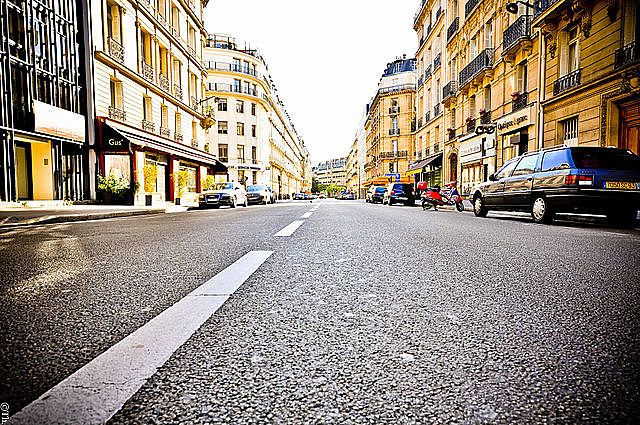Paris, Sans Placards
Florence Reynolds writes from silent Paris streets.
In Paris, the recent attacks are on the forefront of everyone’s minds. They’re the default topic of conversation, practically the sole news items in rolling 24/7 coverage, and given the dry Gallic wit, they’re already the source of many jokes. I arrived on Saturday, a week after the horrific night of events. When I’d booked the flight months ago, I’d attended to arrive to a very different scene.
Fresh from the Eurostar, I formed part of a group of 10 young people seated in a small Parisian apartment, around a table with beers. It could have been anywhere in the world. Except everyone knew someone who had lost a friend or family member in the violence. Earlier, one had been caught up in a heartstopping false alarm when someone had let off firecrackers nearby. Life, however, goes on.
Well, not quite. Part of the French way of life is “faire la grève” and “manifester”; to strike and protest. Indeed, the French are well known internationally for their love of protests that paralyse the middle of their cities for days. But the government has recently banned all demonstrations during the state of emergency, anticipated to last the next three months at least. Within my group of friends, opinion on banning street action is divided. Some understand the measures as necessary, while others feel that their important rights have been violated. Claire, 23, says,“The three months emergency status is too severe. The government is making us sacrifice our freedom. They tell us it is for security. They are not the same thing.”
I do understand the French government’s concern. Immediately after the attacks, and before the demonstration here was formally called off, I seriously considered not attending public actions to draw attention to the issue of climate change myself. A large march would be an ideal setting to kill a large number of people. Even if there wasn’t an attack, the emotional climate here is tense. People are on edge. Any loud noises like fireworks, or a pigeon being electrocuted, and some panic and run - extremely dangerous in a crowded area. If anything were to happen at a climate protest march, it could damage civil society movements for the future. The problem is, without action now on climate change, civilisation may not have much of a future left to damage anyway.
Because climate change is already claiming lives. Over 606,000 lives in the last 20 years from weather events alone, according to a recent UN report. No loss of life through the deliberate act of another is ever justified, but to put it into perspective, this figure is 46,615 times the number killed in the recent terrorism. And these lives are often taken silently; the elderly in heat wave, the poor in a flood, children in a famine. No one changes their profile picture, lights up buildings, holds vigils, or write news pieces about these lost years, lost laughter and love. It is with a painful awareness that civil society watches COP21 count down, knowing Paris is almost our last chance to defuse the climate time bomb and mitigate an era of climate terror.
The government’s choice of what to ban does seem controversial. “After the Charlie Hebdo shootings, there was the biggest protest march since WW2,” a friend tells me. “This time, Christmas markets, sport matches, and restaurants can stay open – it is only protests that have been forbidden.”
While apolitical events involving crowds continue, those which are political in nature have been forbidden. A cynic might say that the Parisian terrorism has simply justified what the government may have wanted to do anyway. Even before the violence, France was planning to restrict travel over its borders for COP21. Others see it as a more purposeful manifestation of the Shock Doctrine, writer Naomi Klein’s theory that governments often use disasters and upheavals to justify unnecessary or repressive policies, as a Facebook event with over 4100 attendees proclaims:
“Nous ne respecterons pas l’interdiction de manifester le 29 pour le Climat… Nous refusons la stratégie du choc qui consiste à utiliser les attentats tragiques de ce vendredi 13 novembre pour restreindre les libertés.”
We do not respect the ban on the 29th November Climate March. We object to the shock doctrine strategy that uses the tragic events of this Friday 13th November to restrain freedoms.
Others are resigned to the ban, but are planning other ways to register their concern about the climate. From mass postering to leaving trails of shoes with messages along streets that would have been marched down, from decentralised marches in small groups to calls for others internationally to march for them, invention is rife. As the Climate Games organisers put it, what may be required is:
…alternative nonviolent response to this state of emergency. Like the mushrooms that emerge at dawn, the ants that scuttle across borders at night we will rise out of fear and shock, we will adapt and resist.
Whatever the true motivation behind the French government’s decision, it highlights world views often hidden below the surface. It is an expression of power dynamics and once again, of how short-term concerns can trump long-term catastrophe. As Klein wrote last week: “Every time governments of wealthy nations fail to act, it sends a message that we in the global north are putting our immediate comfort and economic security ahead of the suffering and survival of some of the poorest and most vulnerable people on Earth.”
I am fully aware of my privilege in being a delegate to COP21; I know there are many who were not able to come. I’m aware of my privilege in being habituated to expressing myself through protests, campaigns and actions. I was going to march alongside French and international citizens for the future of our shared planet. Standing there for my family tree: my ancestors, the children and mokopuna I still hope to have. Representing Aotearoa, England, Wales, and the youth of this planet. I want to use my freedom to be visible on the street, to fight for the security of others lives. I can no longer do this. Over this weekend, I have to hope that others are doing it for me.


